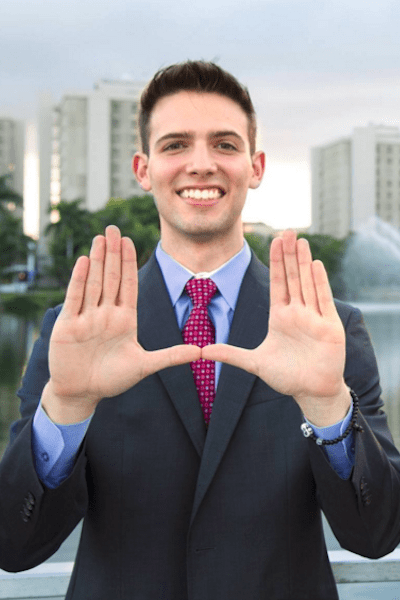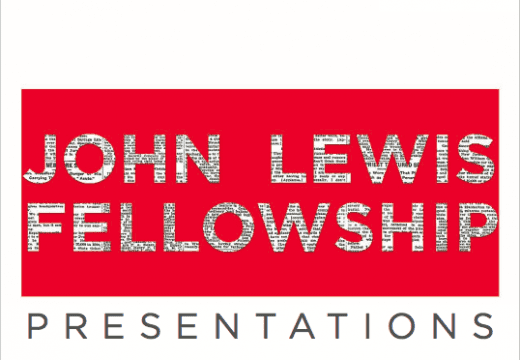Details
Article
Dear reader,
Who I am at this very moment is in many ways a direct consequence of my experience within the John Lewis Fellowship. From this program, the perspectives I have gleaned, the history to which I have been unapologetically introduced, and the stories I have heard have all impacted me at the deepest levels of my own self-understanding. My vision of who I can become “someday” has evolved as a result of the content of this Fellowship.
Fundamentally, I know that who I am today is a result of my socialization since birth. This Fellowship has forced me to confront that I grew up white, and male, in a society whose very foundations were grounded in the fallacious ideals of white supremacy. This Fellowship has forced me to confront the reality that the nation to which I feel a deep attachment and loyalty has built itself upon the backs of black people and the land of indigenous peoples. Indeed, humans who enslaved other humans—white men who ‘owned’ colored men—founded this nation, dishonestly authoring a Constitution asserting the equality of all “men”. My white education presented these white Fathers to me as American heroes. I was raised in the United States of America, land of the free and home of the brave… and, now unquestionably to me, this is the home of the slaves.
In reflecting on my life’s experience, I feel obligated to say plainly that I have not been invulnerable to white supremacy. Looking in the mirror, I see white skin that is inherently benign. Looking beneath the skin, however, I see a white, fraudulent ego that has been convinced— through socialization—that it is superior to other people. [Note: I must now advocate my deeply held spiritual belief that I am not my ego. I believe that ultimately, “I” am my Spirit, which is inherently loving and beautiful and unprejudiced and Divine. Furthermore, I believe this because I have experienced a revelation in which my Sprit revealed itself to me, transforming my worldview. Similar revelations have been documented in William James’s book “The Varieties of Religious Experiences” as well as Ralph Waldo Emerson’s essay, “The Over-Soul.” Importantly, I believe the ego is the part of me that believes it is God—which though it is not, the ego cannot discern otherwise. Transcending my ego, actualizing my true Self: This is a cornerstone of my life’s mission. Overall and in congruence with this dualistic perspective, it is my opinion that egotistical tendencies are shared among all people. It just so happens that white people’s egos attach themselves to quantities of melanin, adopting the socially, politically, and economically devastating brand of egoism we call white supremacy.] Thankfully, the degree to which my ego has been molded by white supremacy is not extreme. The extent of my own notions of white supremacy is principally limited to my subconscious misperceptions of black people as being dangerous—generally as a result of biased and incomplete media depictions. Furthermore, I must admit that classist overtones also resonate in the dark chamber of my ego, pitting my mind against my more deeply held belief that we are all created equal.
Undeniably, this Fellowship introduced to me truths of the past I was largely unprepared to confront.
Undeniably, this Fellowship introduced to me truths of the past I was largely unprepared to confront. The most influential book I read was most certainly The Narrative of the Life of Frederick Douglas. Not only did Douglass’s visceral depictions of slavery shed new light for me on the quality of black enslavement, but also I would say that it was the specific nature of his Will that shook me. This man’s tenacity, his indomitable vision, and the course of modern history: These all are intertwined and cannot be separated. Yes, marching with the BlackLivesMatter protest on the Third Day of this program helped me see that the Will of Frederick Douglass manifests itself in the black Americans of today who risk their lives for Justice. For hours, the unbridled chorus of protestors reverberated down the streets of Atlanta, but when other voices became tired and tapered off, I saw it as my obligation to carry the message of “No Justice, No Peace” as far as my voice could project it, for as long as I was physically able. When the chant became “I love being black,” however, I found myself at a loss of what to say—I knew it was not my chant to say, and I could not think of an appropriate alternative. After this program, however, I am now more confident that in my next BlackLivesMatter march, I can say, “I love that you’re black” and mean it from the bottom of my heart.
To me, these systems represent a Gordian knot—a massively complicated problem with seemingly no real means of untangling.
Before this program, systems of inequality seemed much more distant than they do now. As an advocate for the LGBTQ community, I did understand that there are indeed structures in place that prevent people who live just beyond the horizon of social norms from enjoying full protection from the state and equal opportunity in the economy. But now, after having participated in rigorous intellectual dialogue with the speakers and my fellow Fellows, I am awakened to the broader implications of systems birthed by colonialism and white supremacy. To me, these systems represent a Gordian knot—a massively complicated problem with seemingly no real means of untangling. But, as the Greek myth goes, since the ends of the knot could not be found, Alexander the Great wielded his sword and cut it open, thus untangling it. The Sword with which I will attempt to cut the knot of systematic inequality will be a sword that heals. I believe that white supremacy is a condition of the ego, with the most potent antidote being Humility. Though I still have far to go in my own personal journey, I commit myself to leading in the fight for social justice from a place of humility. Admitting white supremacy is not easy, and it is certainly not comfortable; but, without this accountability, I have no sword with which to heal. White people have been the problem, and yet it is my firm belief that they, we, are an essential component of the solution.
The function of Leadership is to inspire, and if I hope to contribute meaningfully to the legacy of John Lewis, I must take all that I have learned at this Fellowship and allow it to serve as a platform of growth both spiritually and academically. My commitment to social justice has been enriched and purified in illuminating fires of Sankofa wisdom. For this, I will be forever grateful.
With love,
Jacob Rudolph


